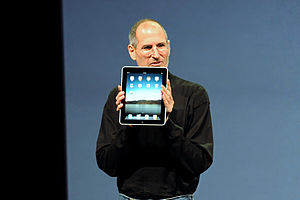
With what I want to believe was ill-disguised glee, Samsung has taken out injunctions against sale of the iPhone 4S in France and Italy over alleged patent infringement. Why just there? It’s difficult not to believe that they’re keeping it commensurate with Apple’s blocking of Galaxy Tab sales in Germany and the Netherlands, that basically they’re saying “If you want to go there, we can go there”.
Do they have a case? Who can tell. The only thing certain is that patents are the new Rock ‘n’ Roll.
And not in a good way. Like Rock ‘n’ Roll in its heyday, the mobile technology world is turning into a filthy quagmire, with pretty much everybody accusing everyone else of stealing about everything – as the illustration shows. The main reason Google purchased Motorola‘s mobile arm was that otherwise the two companies could have sued each other out of existence¹. R&D is rapidly becoming the new A&R, with phone makers patenting about anything in the hope of finding the one elusive hit technology that will rake in unimaginable sums. This wasn’t very good for music, and it won’t be so good for technological innovation either.
While being able to profit from research and invention is a good thing, current law allows companies to charge exorbitant fees or even refuse to license their patents, essentially granting them a monopoly to a lucrative technology. While this was fine in the days when you might patent a tangible device like a mousetrap, now they can be used more or less as intellectual property land-grabs, claiming rights to possible designs. A cause célèbre of course is the granting to Apple of patents so fundamental to a multitouch interface on a mobile touchscreen device that it is hard to see how anyone can now create one without infringing them. Yet Apple did not invent either the multitouch interface or the mobile touchscreen, they were merely the first to put one on the other. Does that really mean they deserve to control the entire concept for the next twenty years?
What might work much better is a short period – maybe only a year or two – of exclusive use. That would decrease the incentive to take out speculative patents on everything, and greatly increase the incentive to, you know, innovate.
- To give the actual science of this: When two corporations collide at sufficiently high financial energies, they either fuse into a single entity or annihilate one another in a shower of fundamental business particles known as “happy lawyers”.
Related articles
- Samsung goes bonkers with iPhone 4S injunction (techeye.net)
- Apple vs. Samsung: Behind the patent fight (macworld.com)
- Samsung seeks to ban iPhone 4S amid patent row (hazima.wordpress.com)
- Samsung targets iPhone 4S in France, Italy (news.cnet.com)

